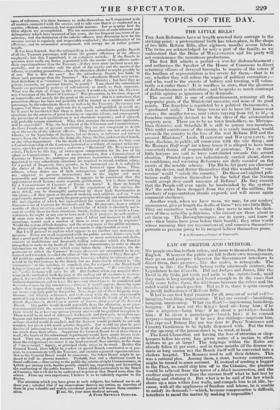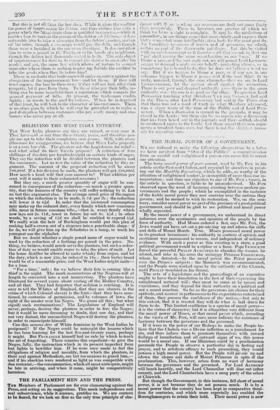LAW OF DEBTOR AND CREDITOR.
No people owe less to their rulers, and more to themselves, than the English. Wherever the public are left to their own management, they go on and prosper; wherever the Government interferes to direct them, their progress, like the crab's, is retrograde. The reason is this : the People belong to the nineteenth century, the Legislature to the fifteenth. Did not Judges and Juries, like the Devil in the fable, put teeth and nails to the statute-book, until they made it long enough and broad enough to fit the cases that daily come before them, the difference between the rulers and the ruled would be much greater. But as it is, there is quite enough to justify half-a-dozen of Reform Bills. What is our first legal panacea for all manner of social evil?— hanging, banishing, imprisoning-. What our sec end?—banishing, hanging, imprisoning. What our third ?—imprisoning, banishing, hanging. If a man cut the King's bead off—hang him; if he coin a sixpence—hang him ; if he shoot a partridge—banish him ; if he shoot a gamekeeper—banish bhp ; if' he commit perjury—imprison him ; if he owe five shillings—imprison him. The rope and Botany Bay are too dear to Peers' Nominees and Country Gentlemen to be lightly dispensed with. But the time of the opening of the prison-doors is, we trust, at hand. The Lord Chancellor, not having the fear of attornies or shop- keepers before his eyes, has given notice of a motion to allow debtors to go at large! The lodgings within the Rules are already fallen 25 per cent.; and in three months (if the disease re- main so long among us) the Bench itself will be converted into a cholera hospital. The Romans used to sell their debtors. This was a rational plan. Among them, a stout, brawny countryman, might be turned to some account. If, instead of sending a beggar to the Fleet, we could ship him off to the Colonies, the planters would be relieved from the terror of a black insurrection, and the creditor might recover from the carcase itself what Ile had lost by feeding and clothing it. But what is to be Said of the law Which shuts up a man within four walls, and compels him to sit idle, be- • cause, with all the appliances of freedom and labour, he is unable' to satisfy its demands ?—which, because compensation is difficult, interferes to mend the matter by making it impossible? But this is not all Is'est the law does. While it gives the creditor the power a impris.oning his debtor, and thus clothes him v. ith power which the Magistrate alone is qualified to exercise,—while it enables him to torture the person of the debtor ad tum,—it dues not en-able him, to take a sovereign from the debtor's pocket, or even a his table, though a sovereign would pay the debt, and though there were a hundred in the one or on the other. It does not allow Intl to seise a pound in the Funds, or in the hands of a neighbour, though the debtor had thousand.' vested in both. The only object of imprisonment for debt is, to compel the debtor to surrender his goods; anti yet, the same law which allows of torture to compel surrender where there is nothing to give up, forbids the creditor to take the goods when they lie before hire ! Them is no doubt that nadestneo Will make an outcry against the abrogation of the imprisonment law—and let them. If they will trust rogues, the loss be their own : if they will not look after their !property, let it pass from them. To those who iety their bills, no- -thing can be more beneficial than a regulation which compels the !general payment of bills. At present, the tradesman credits lightly; he trusts to the gaol fin. redress. When he is deprived of that trust, he will look to the character of his customers. There is no other plan by which he will ever be prevailed on to make a just distinction between customers who pay ready money and cus- tomers who never pay at all.



























 Previous page
Previous page